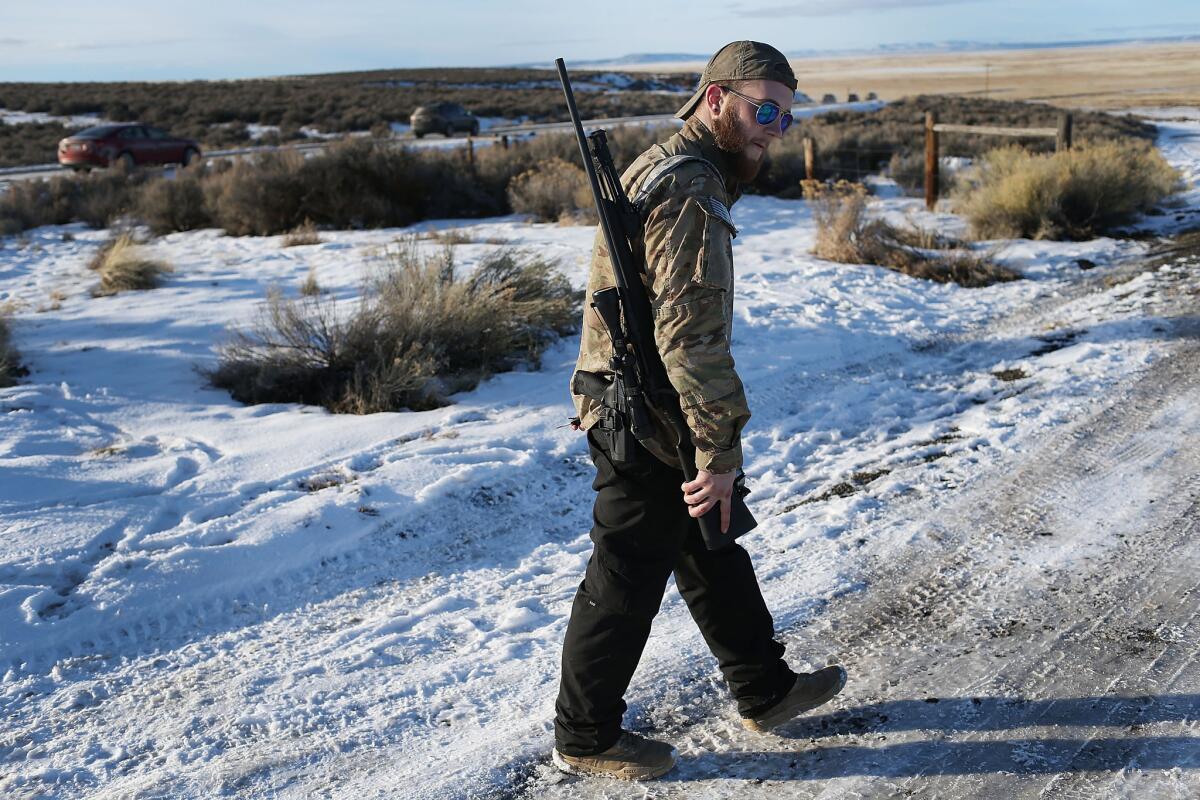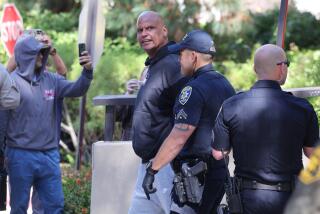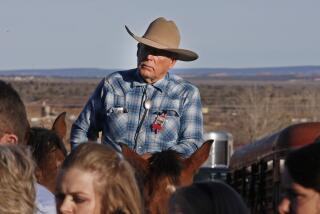Where was the FBI during the armed standoff in Oregon? Out of sight, but listening and watching

A protester keeps watch this month during the armed occupation of the Malheur National Wildlife Refuge in Oregon. The FBI kept a low profile but monitored statements the protesters were making on social media and elsewhere.
- Share via
As the armed occupation of the Malheur National Wildlife Refuge in Oregon dragged on for most of January, local law enforcement was spread thin and federal agents were nowhere to be seen.
Behind the quiet facade, however, the FBI was running surveillance on the occupation and recording the activists’ public statements, mostly drawn from media reports and the activists’ use of social media, while FBI agents encouraged locals to report their experiences with the new strangers in town.
According to the allegations in an indictment and supporting affidavit, the FBI was collecting information that confirmed the occupiers were armed, angry and willing to die.
The court documents detail how a source told a Harney County sheriff’s officer that the protesters “had explosives, night vision goggles, and weapons and that if they didn’t get the fight they wanted out there they would bring the fight to town.” The documents show that authorities grew concerned as the occupiers used increasingly heated rhetoric when discussing their plans and the occupation.
One activist, Robert “LaVoy” Finicum, 55, was shot and killed Tuesday in an altercation between some of the occupiers and authorities. Ryan Bundy suffered a gunshot wound to his arm.
On Wednesday afternoon, U.S. Magistrate Judge Stacie F. Beckerman unsealed the government’s criminal complaint against two brothers, Ammon and Ryan Bundy, and Jon Ritzheimer, as well as five others arrested in connection with the occupation.
All stand accused of conspiring to use threats, intimidation or force to stop federal officers from doing their duty, a charge also used against tax protesters Edward and Elaine Brown, a New Hampshire couple who holed up in their home in 2007 and engaged in an armed standoff with federal agents for months. It eventually ended peacefully with their arrest.
A significant amount of the FBI’s information used to charge Ammon Bundy came from an activist named Pete Santilli, who was living inside the refuge and broadcasting live his conversations with fellow activists.
To demonstrate a conspiracy, the government has a lower burden than it would with similar charges, such as aiding and abetting, or solicitation. A conspiracy charge in federal court does not require the underlying offense to have taken place, so prosecutors can charge the defendants based on their statements, without proving they actually committed a crime.
That is where Santilli’s broadcasts proved so useful to the FBI.
“We’re continuing the stand at the Malheur National Wildlife Reserve,” Ammon Bundy told Santilli in a conversation on Jan. 2, the day the occupation began. “Let everybody know that.”
Later, Bundy was recorded telling Santilli, “Malheur, Malheur,” at which point, the FBI affidavit says, Santilli nods and then introduces Bundy, who gives a speech.
At one point in a video, Santilli’s cameraman is recording Bundy speaking to another activist when the cameraman seems to realize he shouldn’t be broadcasting it. The cameraman steps away and bumps into someone. “I was trying to get away from that conversation,” he explains.
The charges filed Wednesday detail activists’ behavior in the media and the behavior reported to the FBI by federal employees who said they endured threats from the protesters in town before the occupation.
One employee with the U.S. Bureau of Land Management, a prime target of the protesters, said Ritzheimer, an anti-Muslim activist who led an armed protest at a mosque last May, and another man accosted her in a grocery store for wearing a BLM shirt.
“When she turned around, the second individual shouted ‘you’re BLM, you’re BLM,’ at her,” FBI Special Agent Katherine Armstrong wrote in the affidavit.
“That person further stated to [the BLM employee] that they know what car she drives and would follow her home. He also stated he was going to burn [her] house down.”
See more of our top stories on Facebook >>
Then activists began targeting her, she said. A vehicle matching one she saw Ritzheimer and the other man driving began to appear parked in front of her home and in front of her workplace, she said.
A week later, a white truck with a Confederate flag sticker in the rear window tailgated her and flashed its lights, the affidavit says.
The documents are also sprinkled with repeated references to the occupiers’ principle concerns—upholding the Constitution, protecting the rights of individuals and crushing socialism. It also quotes various protesters using social media to urge “good patriots” to join the occupation.
Twitter: @nigelduara
ALSO
Californians bought a year’s worth of Powerball tickets in 10 weeks
Alleged gang members arrested in O.C. jailbreak probe, but 3 escapees still at large
Good time turned ugly after teasing for Blake Griffin and Clippers assistant
More to Read
Sign up for Essential California
The most important California stories and recommendations in your inbox every morning.
You may occasionally receive promotional content from the Los Angeles Times.











